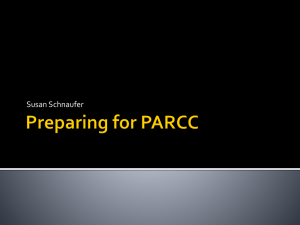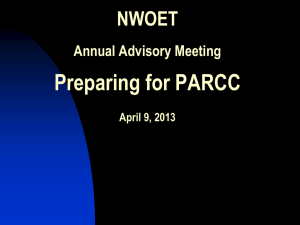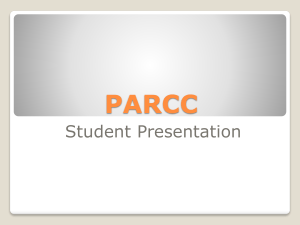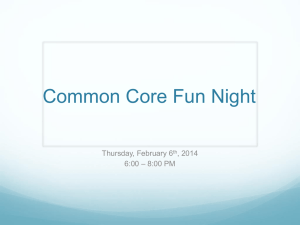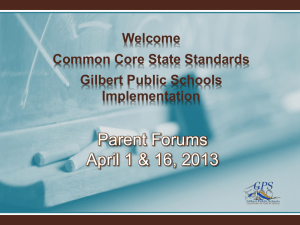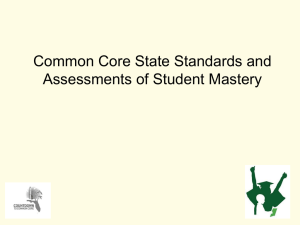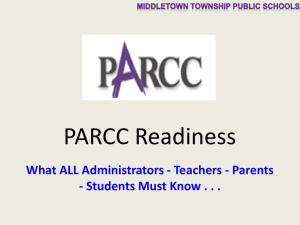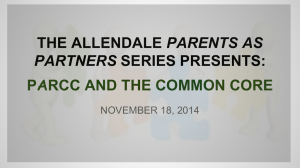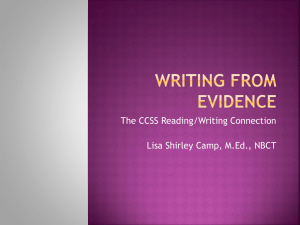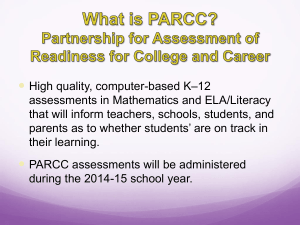Math_MS_Coherence
advertisement
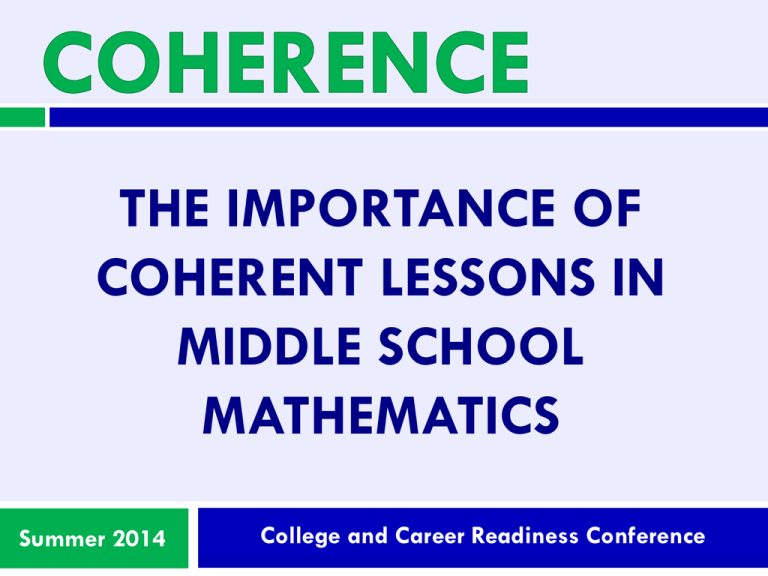
THE IMPORTANCE OF COHERENT LESSONS IN MIDDLE SCHOOL MATHEMATICS Summer 2014 College and Career Readiness Conference Based on RIGOR: Reduce Side Chatter Involve Yourself in the Process Give Your Thoughts and Ideas Open Your Mind to How You Can Change Instruction Remember to Silence Electronic Devices Focus Coherence Rigor 1. Conceptual Understanding 2. Procedural Skill 3. Modeling/Application Coherence comes from the verb to cohere, which means: • To stick together in a way that resists separation; • To be logically linked and naturally related. Think of Rice Krispies Treats… We want our mathematics curriculum to have coherence… related concepts that stick together in a way that is obvious, understandable, connected, and reliable… for teachers and students alike! A purposeful placement of standards to create logical sequences of content topics that bridge across the grades, as well as across standards within each grade. TODAY’S OUTCOME Participants will: Explore in depth the “shift” of COHERENCE and its impact on mathematics content, instruction, and assessment of the Maryland CCR Standards in mathematics. CONTENT The writers of the CCSS: Built standards. into the content Clarified and shared their vision of grade-to-grade and within-grade in the Progressions documents. http://ime.math.arizona.edu/progressions/ 1. Compute the correct answers. 2. What strategy did YOU use to approach/solve this problem? What other strategies might work, as well? 3. What are the mathematics concepts/skills that you must know in order to solve the problem? 4. What are the grade levels for these concepts/skills. 5. In your own classroom, how would you handle a situation in which students used a variety of strategies? What would you do if some strategies did not match the strategy in your textbook? http://www.illustrativemathematics.org/illustrations/1564 Chichén Itzá was a Mayan city in what is now Yucatan, Mexico. This photo shows the Pyramid of Kukulcán, which is located in the ruins of Chichén Itzá . The floor of the temple at the top of the pyramid is approximately 24 meters above the ground, and there are 91 steps leading up to the temple. How high above the ground would you be if you were standing on the 50th step? INSTRUCTION Grade From Grade to Grade 5th Understanding of fraction equivalence and the skill to generate equivalent fractions leads to the study of ratios. 6th Skills with multiplication, division and fractions, contribute to the study of ratios and unit rates 7th Analyze proportional relationships and solve problems involving unit rates associated with ratio fractions. 8th Use similar triangles to prove that the slope of a line is welldefined and understand the points (x,y) on a non-vertical line are solutions to the equation, y= mx + b, where m is the slope of the line as well as the unit rate of a proportional relationship. INSTRUCTION Scientists are sending a rover to the moon. Their plan is to study a rectangular area of the moon using the map shown. On the grid, 1 unit represents 1 kilometer (km). http://www.parcconline.org/sites/parcc/files/FractionModelFINAL.pdf INSTRUCTION Grade 5 from Domain to Domain NBT.B.7 Add, subtract, multiply, and divide decimals to #1s hundreds… using strategies based on place value and properties of operations... NF.B.4b Find the area of a rectangle with fractional side lengths #2s by tiling it with unit squares… and show that the area is the same as would be found multiplying the side lengths. MD.A.1 #3s G.A.1 #4s Convert among different-sized standard measurement units within a given measurement system… and use these conversions in solving multi-step, real-world problems. Graph points on the coordinate plane to solve real-world and mathematical problems. INSTRUCTION Part A The rover will land at (3.5, 1) to explore up to (3.5, 4), and then over to (2, 4). Plot these three points on the map. Part B What are the coordinates of the fourth vertex of the rectangle that the scientists plan to explore? ( ____, ____ ) http://www.parcconline.org/sites/parcc/files/FractionModelFINAL.pdf INSTRUCTION Part C What is the horizontal length of the rectangle? ___________ kilometers What is the vertical length of the rectangle? ___________ kilometers Part D Find the area of the moon exploration. Show your work. http://www.parcconline.org/sites/parcc/files/FractionModelFINAL.pdf ASSESSMENT Evidence of in assessment is not tremendously different from evidence of in classroom instruction. ASSESSMENT Scientists are sending a rover to the moon. Their plan is to study a rectangular area of the moon using the map shown. On the grid, 1 unit represents 1 kilometer (km). http://www.parcconline.org/sites/parcc/files/FractionModelFINAL.pdf ASSESSMENT •Type III task that calls for modeling and application in a real-world context (MP.4) •Which other Standards for Mathematical Practice are assessed in this task? • Content standards are assessed as securely-held knowledge from grade 5. ASSESSMENT 1. Make sense of problems and persevere in solving them. 2. Reason abstractly and quantitatively. 3. Construct viable arguments and critique the reasoning of others. 4. Model with Mathematics. 5. Use appropriate tools strategically. 6. Attend to precision. 7. Look for and make use of structure. 8. Look for and express regularity in reasoning ASSESSMENT • 5.NBT.B (Major) • 5.NF. B.4b (Major) • 5.MD. A.1 (Major) • 5.G.A.1 (Supporting) In reality, the “key” to making the Shift of Coherence a success rests in the arms of curriculum writers and classroom teachers. Instruction should take advantage of every opportunity to build connections between topics within a given grade, as well as between grades. Illustrative Math https://www.illustrativemathematics.org/ • Bill McCullum, CCSS lead writer • Sample Lessons that illustrate specific standards Achieve The Core https://achievethecore.org • Jason Zimba, CCSS lead writer • Multiple Resources – e.g. Lesson Plans, Assessments, Professional Development courses, Grade-at-a-Glance PARCC http://parcconline.org • Information about PARCC Assessments • Sample Lessons • Practice Tests
